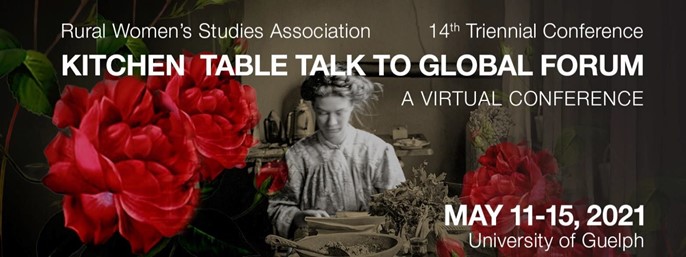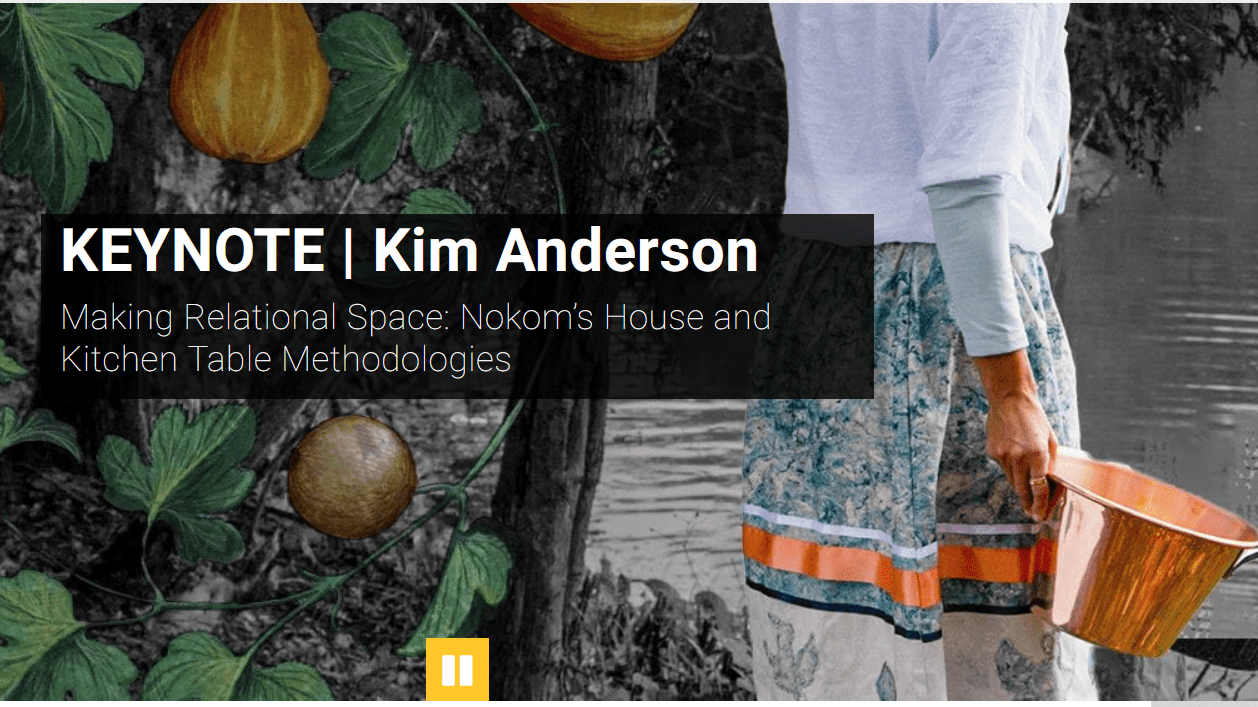Catharine Wilson (RWSA Co-Chair 2015-2021 and Conference Host)
During 11-15 May 2021, 221 people gathered at the RWSA 14th Triennial Conference, hosted by the University of Guelph. This was the RWSA’s first virtual conference and a great success. The conference theme, Kitchen Table Talk to Global Forum, attracted people from fourteen countries who shared their research about rural women, food, and other issues on the table: activism, feminism, social justice, mental health, innovation, community development, and cultural expression, — both historical and contemporary — locally and globally.

For two years, the Local Arrangement Committee (LAC) had been making plans to hold the conference on the University of Guelph campus in Canada. They had arranged pre- and post conference tours, performers, special dining events, and raised $40,00 in cash and in-kind sponsorship. Then the pandemic hit in March of 2020 and these much-anticipated events were replaced with uncertainty and risk. It was no longer feasible to meet in person. No vaccine existed, some people had lost funding and were worried about their jobs, and others were not able to travel internationally. Organizers did not want to put participants at risk. Outright cancellation was not good for the organization, as six years would have passed before the next scheduled conference. Postponing it to 2022 raised questions about whether the economy and travel would be normalized by then.
The RWSA decided to go virtual, and the great pivot began. The Program Committee notified panelists of the decision and the LAC renegotiated with sponsors and performers and cancelled tours and venues. The LAC created a conference website and selected Hopin as a virtual hosting platform because it was supported by the University of Guelph and had session rooms, a stage, an expo hall, AND attendees could chat with a friend, network with colleagues, and make new contacts, valued informal experiences that are the hallmark of RWSA conferences.

The conference began with the launch of A Taste of Backstories: The Kitchen Table Talk Cookbook which featured our members’ heirloom recipes, storytelling, and scholarly content. Special events throughout the week included keynote speaker Métis Dr. Kim Anderson’s presentation on Indigenous “Kitchen Table Methodologies,” food as a tool of colonization, and making a territorial acknowledgement a practice. In a special plenary session, panelists and the audience discussed how COVID-19 was affecting rural women. Another plenary addressed mentorship and development networks. Performances included music therapist Mary Parkinson who told her family’s rural life story through period music, and the week ended with theatre artist Taylor Graham and her students presenting excerpts from the Canadian classic play The Farm Show. Throughout the week, the expo hall featured culinary collections, rural organizations, farm yoga, and historical mini documentaries.

Going virtual was the right decision. It gave presenters and organizers the security of knowing they could plan, the event occurred according to our triennial schedule, without risk to participants and with less expense for the organization and attendees. Our attendance doubled, as with no travel and accommodation costs, more people joined who might otherwise have found it too expensive. The reach of the conference extended making our conference theme “Kitchen Table Talk to Global Forum” even more meaningful as people joined in the discussion from France, Australia, Nigeria, India, Netherlands, Argentina, Canada, the U.S., and other countries.
The experience had its challenges and some unexpected advantages too. We had to work with a world clock as the program took shape. Participants needed training within the virtual environment and with varying home equipment and internet access sometimes struggled to upload their slides and videos. Such challenges pulled people together as we helped each other. Once familiar with the online environment, participants engaged in lively discussions in thirty-five sessions, thematic break-times, and in the lounge area. Displays and live demonstrations took place in the expo area. We missed the opportunity to hug friends, the bus tours, the Saturday morning trip to the market, those chance encounters in the cafeteria lineup, and dinners on the town, but the online experience provided advantages beyond those listed above. One could knit while listening to a panel from the comfort of their home office and no one needed to pack a suitcase, stand in long airport lineups, or struggle with sleepless nights in a strange bed.
Altogether people found the experience rewarding so that future conference organizers are considering the possibility of hybrid conferences.
